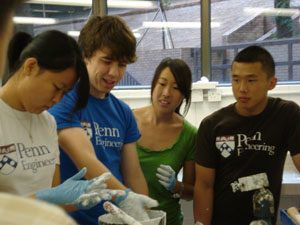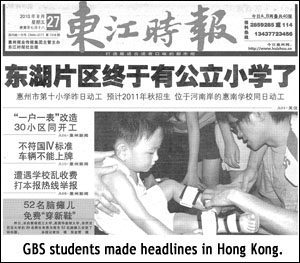Global Citizenship: Serving to Learn, Learning to Serve
 Penn Engineering’s commitment to “global citizenship” provides many opportunities for undergraduates to travel and serve abroad. A concept founded in the idea that each person has a responsibility to both local and international communities, “global citizenship” enables Penn Engineering undergraduates to undertake various hands-on projects that engage them with local citizens and leaders to provide solutions that meet local needs.
Penn Engineering’s commitment to “global citizenship” provides many opportunities for undergraduates to travel and serve abroad. A concept founded in the idea that each person has a responsibility to both local and international communities, “global citizenship” enables Penn Engineering undergraduates to undertake various hands-on projects that engage them with local citizens and leaders to provide solutions that meet local needs.
This summer, the Global Biomedical Service (GBS) Program, an integral part of this commitment, took 12 Penn Engineering students and traveled abroad to Huizhou, China, to make orthotics for children with neuromusculoskeletal disorders. GBS is an academically-based service initiative that provides undergraduates with a unique opportunity to participate in delivering clinical services to underserved communities internationally, and to undertake an enriching cross-cultural experience while doing so.
GBS is offered through a vital partnership with the Hong Kong Polytechnic University (HKPolyU). Penn students are paired in teams with HKPolyU students, providing a rich environment for learning, serving, and cross-cultural exchange.
 Penn faculty who participated in this year’s course and trip included Dan Bogen, professor of Bioengineering and Bioengineering in Pediatrics, the faculty leader of the program and Ken Foster, professor of Bioengineering and Electrical and Systems Engineering, who joined the group in Hong Kong for the trip. In the past, the list of participating faculty has also included Beth Winkelstein and Jason Burdick, both associate professors of Bioengineering. In addition to Penn faculty, the program includes lectures by James Chan, on Chinese culture, history and Cantonese language.
Penn faculty who participated in this year’s course and trip included Dan Bogen, professor of Bioengineering and Bioengineering in Pediatrics, the faculty leader of the program and Ken Foster, professor of Bioengineering and Electrical and Systems Engineering, who joined the group in Hong Kong for the trip. In the past, the list of participating faculty has also included Beth Winkelstein and Jason Burdick, both associate professors of Bioengineering. In addition to Penn faculty, the program includes lectures by James Chan, on Chinese culture, history and Cantonese language.
Samantha “Sammy” Wang, a bioengineering major and this year’s student leader, remarked, “I really enjoyed the course that we took to prepare us for traveling to China. James Chan understands the psyche of the Chinese people and was able to distill it into relevant information for our interactions. I was very impressed with his lessons on culture, history, and social customs and learned a lot from the course. I also really appreciated the information that Dr. Bogen presented on cerebral palsy and prosthetics and orthotics technology.”
The GBS Program consists of a 9-week preparatory course for students and a 16-day trip to the onsite location. This year’s trip marked the fifth year that GBS students from Penn have traveled to China. Working in small teams and paired with undergraduates from HKPolyU, students worked together to measure patients, design and build the orthotic devices, and then properly fit each orthotic for use by patients.
Wang notes, “The HKPolyU students were great with the children and were able to calm them down, reassure them about the procedures, and keep them entertained. Aaron Leung, an HKPolyU professor and program director, had a great bedside manner, and it was very impressive to watch him in action. I learned a lot about what makes a good clinician from watching him work.”
Initially delevoped by Joe Sun, Vice Dean for Academic Affairs at Penn Engineering, and former bioengineering faculty member, Arthur Mak, now the Chair Professor of Rehabilitation Engineering at HKPolyU, the GBS program is a perfect example of the School’s commitment to make the world a better place through engineering.
